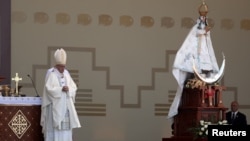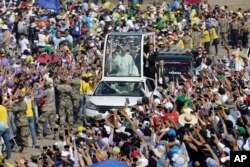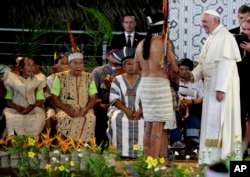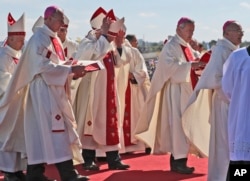Pope Francis told some 200,000 people at an outdoor Mass Saturday in an area of northwestern Peru that is still struggling to recover from devastating floods that took place last year not to lose faith during difficult times.
“These times of being buffeted call into question and challenge our strength of spirit and our deepest convictions," the pontiff told the crowd at the beach town of Huanchaco just outside the city of Trujillo. "They make us realize how important it is to stand united, not alone, and to be filled with that unity which is a fruit of the Holy Spirit."
The pontiff then rode through the poor neighborhood of Buenos Aires, which was particularly hard-hit by flooding last spring. Floods and landslides fueled by the El Nino weather phenomenon toppled hundreds of thousands of homes and killed more than 150 people. Thousands in the area are still living in tents and many frustrated people hoped the pope's visit will hasten the pace of reconstruction.
Francis also mentioned organized violence and killings that are especially acute in the region, telling Peruvians life's greatest challenges can be overcome when communities unite "to help one another like true brothers and sisters."
Francis later presided over a ceremony in the town square before a crowd of thousands followed by a meeting with clergy members.
The pope's trip to Trujillo province comes one day before he returns to Rome after a week-long trip to Chile and Peru.
On the latter part of his visit to Chile, Francis demanded that governments and other institutions end the exploitation of the Amazon rainforest and recognize the region's indigenous people as the main caretakers of what he called "our common home."
Speaking to thousands of people deep inside the Amazon, Francis condemned the "pressure being exerted by great business interests" seeking petroleum, gold, lumber and other natural resources and plundering the area "without concern for its inhabitants."
The pope was greeted warmly Friday in the Peruvian city of Puerto Maldonado by thousands of enthusiastic supporters who lined the streets before his meeting with the country's indigenous people.
Francis arrived in Puerto Maldonado, considered the gateway to the Amazon rainforest, after flying Thursday from Chile to the Peruvian capital of Lima.
The pope met in the city's coliseum with several thousand indigenous people representing more than 20 indigenous groups, who had hoped he would deliver a strong message urging the government to recognize their land rights and clean up rivers that have been contaminated by illegal mining.
The pope's warm welcome to Puerto Maldonado was in sharp contrast to his visit earlier this week to Chile, which drew smaller crowds and whose presence sparked protests.
Before departing Chile Thursday, the Argentine pope accused abused victims of a pedophile Chilean priest of slandering a bishop who they say protected the perpetrator.
Speaking to reporters before leaving, Francis said until he sees proof that Bishop Juan Barros was complicit in covering up the sex crimes of the Rev. Fernando Karadima, such accusations against him are “all calumny.”
"The day they bring me proof against Bishop Barros, then I will speak," the pope said in response to a reporter's question about Barros prior to celebrating an open-air mass in the northern Chilean city of Iquique.
The pope's remarks undermined his efforts to rehabilitate the Catholic Church’s reputation while visiting South America and shocked Chileans and drew immediate rebuke from victims and their advocates.
They noted the accusers were deemed credible enough by the Vatican that it sentenced Karadima to a lifetime of “penance and prayer'' for his crimes in 2011.
A Chilean judge also found the victims to be credible, saying that while she had to drop criminal charges against Karadima because too much time had passed, proof of his crimes was not lacking.
Many Chileans are still angry about the pope's 2015 decision to appoint Barros, a Karadima protege, as bishop of the southern city of Osorno. Barros' controversial appointment has divided the diocese, as he has denied being aware of Karadima's abuse, and local Catholic groups in his southern diocese of Osorno are demanding that Francis remove him.
One of Karadima's victims, Juan Carlos Cruz, said Barros "is a liar, a delinquent, who has amnesia after covering up for Karadima. He has covered-up abuses and should be in jail or at least dismissed."
Barros, who was attending the mass with hundreds of other bishops and clergy, has had a conspicuous presence at both of the pope's previous open-air masses and his meeting with clergy at the Santiago cathedral.
The pope also met in Santiago Tuesday with survivors of clerical sex abuse. The pope wept with them and asked forgiveness for the "irreparable damage" they suffered as children when they were sexually abused by priests — a scandal that has damaged the Catholic Church's integrity and cast a pall over the pope's first visit to the country.
The U.S.-based non-governmental organization Bishop Accountability reported last week that nearly 80 Catholic clergy members had been accused of sexually abusing Chilean children since 2000.
A recent Latinobarometro survey said the crisis triggered a sharp drop in the number of Chileans who consider themselves Catholic, as well as a decline in confidence in the church as an institution.
The distrust extends to Pope Francis in Chile, a country that gives him the lowest approval rating among the 18 Latin American countries in the survey.



